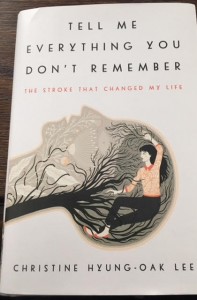 Trauma is never simply a single, isolated event. Its impact occurs in cascading waves that ripple out in multiple directions at disparate periods in time. Present trauma builds upon trauma from our past–the experiences are distinct, yet not separate. While an initial traumatic event might have already happened once, its impact and repercussions will be felt anew again and again, until we can learn to break the cycle.
Trauma is never simply a single, isolated event. Its impact occurs in cascading waves that ripple out in multiple directions at disparate periods in time. Present trauma builds upon trauma from our past–the experiences are distinct, yet not separate. While an initial traumatic event might have already happened once, its impact and repercussions will be felt anew again and again, until we can learn to break the cycle.
As memoirist Christine Hyung-Oak Lee writes: “Remembering trauma is to feel that trauma all over again”; to do so can be painful, uncomfortable, awkward and confusing. And yet, by sitting with it, observing it, and even leaning into it, it imparts wisdom about where we came from and who we are now. By identifying and unweaving the intertwined threads of trauma and memory, as Lee does expertly and poignantly in Tell Me Everything You Don’t Remember, we can rewrite a narrative of our lives that is insightful, empowering and–ultimately–healing.
This book is a masterclass in excavating memory–teasing out the truth from the false stories we come to believe (and endlessly retell) about ourselves. It is a guide for confronting trauma and engendering healing through sharing stories and unpacking the conscious and unconscious lessons that our childhood and upbringing have taught us. And it is a beautiful, bold and brave account of a woman finding (and fighting) her way back from the devastation of massive stroke that threatens everything she holds dear. It is about the arduous, yet inspiring journey to find the words to tell the truth about your experience(s), so that you can face the future with your head held high–heart and eyes wide open.
Notable Book Quotables
“And now I understand that it is through emotions that things are most permanent in my brain, It is when something pierces my heart that it enters a part of the brain otherwise inaccessible. Happy experiences. Joyful ones. Angry. Sad. Scared. It all matters, I have learned.”
“I learned that memory comes in modules. That narrative comprises pieces that must be woven together to create a unique texture and pattern. They are connected by pieces of thread.”
“Storytelling is emotional. It is about asking people to remember something that meant something to you, and the only way someone can remember your story is if it strikes the heart, at the reader’s emotional center. And it must be authentic.”
“Each time I have overcome trauma, it was by facing, in some way, the trauma preceding it.”
“Remembering trauma is to feel that trauma all over again.. I thought I had to have distance to see the thing as a whole…but I learned that trauma is not a separate thing, it is an experience that folded itself into my body and mind and brain. I had to hold it close, sit with the discomfort and pain, and not push it away. It took a while to learn this…I held the fear and hurt and pain a confusion, long desiccated. I didn’t know what to do with it. I stared at it. I held it at arm’s length. It was disturbing, And then it was awkward. And then I became used to it. And then it became valuable.”
“Part of trauma is about being stuck in the past.”
“My stroke laid bare the inner mechanisms of my brain, the way words are formed and then connected and the way ideas link into a story. It is only by losing the ability that you an truly understand its place; stories are told in modules. One thing leads to another.”
Leave a Reply